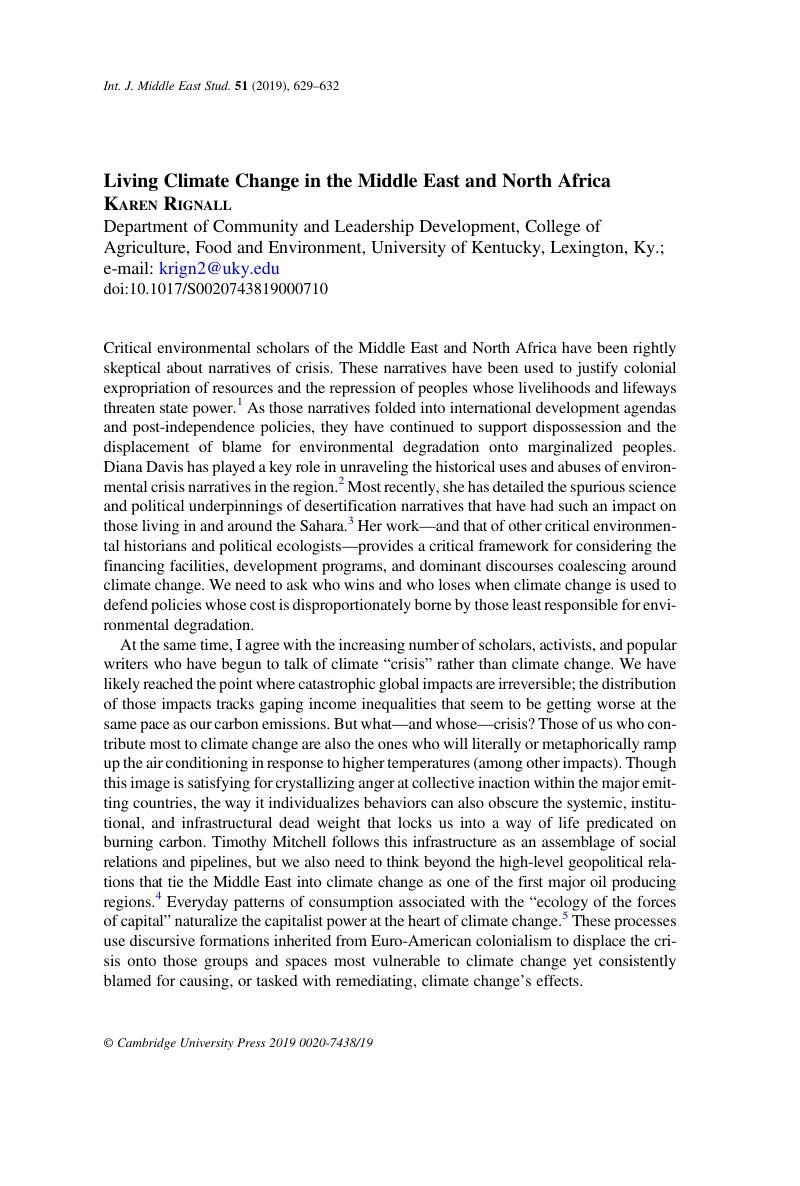Published online by Cambridge University Press: 04 October 2019

1 Davis, Diana K. and Edmund, Burke, eds., Environmental Imaginaries of the Middle East and North Africa (Athens: Ohio University Press, 2012)Google Scholar.
2 Davis, Diana K., “Indigenous Knowledge and the Desertification Debate: Problematising Expert Knowledge in North Africa,” Geoforum 36 (2005): 509–24CrossRefGoogle Scholar; Davis, , “Neoliberalism, Environmentalism and Agricultural Restructuring in Morocco,” Geographical Journal 172 (2006): 88–105CrossRefGoogle Scholar; Davis, , Resurrecting the Granary of Rome: Environmental History and French Colonial Expansion in North Africa (Athens, Ohio: Ohio University Press, 2007)Google Scholar.
3 Davis, Diana K., The Arid Lands: History, Power, Knowledge (Cambridge, Mass.: Massachusetts Institute of Technology Press, 2016)CrossRefGoogle Scholar.
4 Mitchell, Timothy, Carbon Democracy: Political Power in the Age of Oil (London: Verso, 2011)Google Scholar.
5 Huber, Matthew T., Lifeblood: Oil, Freedom, and the Forces of Capital (Minneapolis, Minn.: University of Minnesota Press, 2013), xviiCrossRefGoogle Scholar.
6 See, e.g., Boyer, Dominic D., “Energopower: An Introduction,” Anthropological Quarterly 8 (2014): 309–34CrossRefGoogle Scholar; Huber, Matthew T. and McCarthy, James, “Beyond the Subterranean Energy Regime? Fuel, Land Use and the Production of Space,” Transactions of the Institute of British Geographers 42 (2017): 655–68CrossRefGoogle Scholar; Jalbert, Kirk, Willow, Anna D., Casagrande, David, and Paladino, Stephanie, eds., ExtrACTION: Impacts, Engagements, and Alternative Futures (New York: Routledge, 2017)CrossRefGoogle Scholar; Paladino, Stephanie and Simonelli, Jeanne, “Hazards So Grave: Anthropology and Energy,” Culture, Agriculture, Food and Environment 35 (2013):1–3CrossRefGoogle Scholar; Strauss, Sarah, Rupp, Stephanie, and Love, Thomas, eds., Cultures of Energy: Power, Practices, Technologies (Walnut Creek, Calif.: Left Coast Press, 2013)Google Scholar; and Veltmeyer, Henry and Petras, James, eds., The New Extractivism: A Post-Neoliberal Development Model or Imperialism of the Twenty-First Century? (London: Zed Books, 2014)Google Scholar.
7 Cantoni, Roberto and Rignall, Karen, “Kingdom of the Sun: A Critical, Multiscalar Analysis of Morocco's Solar Energy Strategy,” Energy Research and Social Science 51 (2019): 20–31CrossRefGoogle Scholar; Rignall, Karen, “Solar Power, State Power, and the Politics of Energy Transition in Pre-Saharan Morocco,” Environment and Planning A 48 (2016): 540–57CrossRefGoogle Scholar.
8 Fairhead, James, Leach, Melissa, and Scoones, Ian, “Green Grabbing: A New Appropriation of Nature?,” Journal of Peasant Studies 39 (2012): 237–61CrossRefGoogle Scholar.
9 Tsing, Anna L., Friction: An Ethnography of Global Connection (Princeton, N.J.: Princeton University Press, 2005)CrossRefGoogle Scholar.
10 Timothy Mitchell, Rule of Experts: Egypt, Techno-Politics, Modernity (Berkeley, Calif.: University of California Press, 2002).
11 Zurayk, Rami, el-Awar, Faraj, Hamadeh, Shady, Talhouk, Salma, Sayegh, Christine, Chehab, Abdel-Ghani, and Shab, Kassem al, “Using Indigenous Knowledge in Land Use Investigations: A Participatory Study in a Semi-Arid Mountainous Region of Lebanon,” Agriculture, Ecosystems and Environment 86 (2001): 247–62CrossRefGoogle Scholar; Zurayk, Rami, Food, Farming and Freedom (Beirut: Just World Books, 2012)Google Scholar.